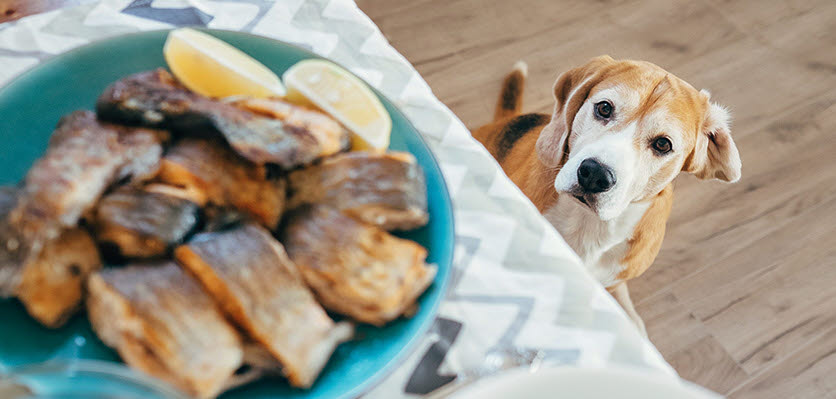
The temptation to share with your best friend can be hard to resist, especially when your dog gives you those big, wistful eyes whenever you sit down for a delicious meal. However, there are plenty of foods that we can consume safely that may compromise your dog’s health so it’s important to know what foods need to be avoided and why.
Chocolate and caffeine: Dark or unsweetened chocolate is the most dangerous, but any form of chocolate or caffeine can result in vomiting, diarrhoea, heart issues, seizures, and even death depending on the amount consumed.
Onion and garlic: Ingestion of either of these can affect the red blood cells and cause anaemia which can present through vomiting, weakness, and breathing issues.
Dairy: Many dogs are lactose intolerant, so the consumption of dairy products can cause diarrhoea and other digestive problems. Dairy in small doses may not cause significant issues but it is worth being wary when offering a treat from your plate.
Grapes and raisins: It is not yet known exactly what causes grapes and raisins to be toxic and while individual sensitivity can vary, as little as a handful of either can cause vomiting, lethargy, kidney failure, and death.
Avocado: The fruit contains a toxin called persin which can cause vomiting and diarrhoea when ingested in large quantities.
Cooked bones and corn cobs: Cooked bones have the potential to splinter and perforate the digestive tract as well as be a choking hazard. Bones and corn cobs can be difficult to pass and can cause obstructions that require surgical intervention to remove.
If you are wanting to feed raw bones, please do so with caution and reduce risk by ensuring the bones are not soft enough to splinter and are big enough to be chewed, not swallowed. Raw bones should be given while under supervision and removed once your dog has finished with them.
Fatty foods: Pancreatitis is a condition where the pancreas becomes inflamed, causing gastric upset and abdominal pain which often occurs as a result of eating rich, high-fat foods. In severe cases, it can lead to hospitalisation and become life-threatening. Signs include lack of appetite, vomiting, diarrhoea, lethargy, abdominal pain, bloating, and discomfort.
Nuts: Being high in salt, fat, and oils, nuts can trigger vomiting, diarrhoea, and in some cases, pancreatitis. Macadamia nuts are particularly dangerous with weakness, tremors, vomiting, and fever presenting in dogs within 12 hours of consumption.
Xylitol: An artificial sweetener that can be found in baked goods, chewing gum, toothpaste, sugar-free sweets, and in certain brands of peanut butter. In dogs, it can cause a massive insulin release with signs occurring within twenty minutes after consumption, including lethargy, vomiting, loss of coordination, which can lead to seizures, liver failure, and death.
Yeast dough: The dough can rise inside a dog’s stomach, releasing gas which can cause the stomach to bloat and twist creating a life-threatening emergency. The ethanol by-product produced by the yeast can also lead to alcohol poisoning.
Human foods that are safe for dogs to consume in small quantities include raw or cooked carrots, fresh blueberries and strawberries, bananas, plain boiled chicken, watermelons and apples without the seeds or core as well as a variety of vegetables. If you’re unsure, check with a veterinarian first before you introduce it to your dog’s diet.
In the event that your dog eats something on the above list, contact your veterinarian immediately with the type of food and amount ingested in order to achieve the best care and outcome for your dog.
